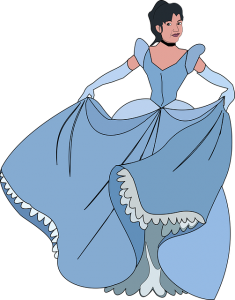Check out this article written by a professor at my alma mater, Taylor University. Her name is Amy Lepine Peterson and she offers a critique of Karen Kingsbury’s children’s books about princes and princesses.
Here is the link to the article: http://tinyurl.com/9nbmofh
Now that you’ve read it, here’s my thought:

The character of a princess in many centuries-old legends and myths is that of a passive damsel-in-distress, lady-in-waiting, I’m-helpless-so-come-and-save-me woman. Modern retellings (Tangled and Shrek, for example), try to push against this stereotype and show a strong, active, I-can-fight-with-the-big-boys woman.
It sounds to me like Amy Lepine Peterson is not suggesting that the traditional princess character is necessarily a dangerous model for our daughters. I think she is simply saying that Karen Kingsbury takes it too far by offering a nameless, completely passive female.
This discussion gets to the heart of gender roles, egalitarianism and complementarianism. What kind of women (real or fictional) to whom do we want our daughters aspiring? The princess model does appear to come from a time in history when women had an extremely inferior status to men in society. So taken to the extreme, I wouldn’t want my daughter to learn to be a helpless lady-in-waiting either.
But what about redefining the princess role? What about showing our daughters the real princesses of the Bible: Ruth, Esther, Mary, Deborah, Sarah, Priscilla, and many more? My favorite are the daughters of Job: Jemimah, Keziah, and Karen-Happuch. They were said to be the most beautiful women in all the land and they got an inheritance along with their brothers (and note that they are named at the end of Job and their brothers are not). I guess that’s why we named our strong princess daughter Keziah 🙂




4 responses to “The Princess Problem”
Although about your comment with modern princesses becoming more assertive and taking the strong lead in the family, I still think almost all of the old and new princess stories revolve around parental defiance and almost all of them run away, which I cannot get behind. Even in the newest film Brave, which personally I love, E and E will have to be significantly older and more mature to understand the value of the tales and not just take away pieces that are detrimental if taken by themselves.
Hey, Naomi. True. I never thought about the parental defiance and running away aspect. But I can see that when I think through various princess stories. And I agree that certain aspects of a story can be unpacked at different ages. In my opinion, one of the worst defiance stories is Nemo in Finding Nemo. At least the movie shows (as do many princess stories) that running away will get you into A LOT of trouble. But a good narrative needs trouble (so it can be resolved), so the trouble has to come from somewhere 🙂
Hey Jesse –
Good points all around. Having 2 (and soon 3) daughters of my own, and wanting them to embrace Biblical womanhood, these topics are near and dear to me. I also have a son – and think that the emasculation of men in our society is as equally disturbing as the feminist movement. We were created equal but different with each other as men and women. We have different God-ordained roles, and I don’t think Hollywood, or Disney, are doing Christian parents many favors on teaching what that should look like.
What of men acting with chivalry and treating women with respect – considering the needs of others over their own (Phil. 2), rather than objectifying or generalizing them by looks alone? Or how about the the shrewd wisdom of Abigail (I Sam. 25) or the wife of noble character in Proverbs 31? I agree – let’s teach our daughters about women that are wise, strong, and beautiful!
I have imaginative daughters that love playing princess – but it isn’t the passive, mindless beauty found in movies, or the rebellious headstrong daughter that Disney has loved to portray. They are strong, active, and assertive while still learning to be gentle and sober-minded. It’s my job, as “daddy” to help teach my daughters what a man should treat them like, and my wife teaches what the strong determination and character of a Godly woman can do in a society that currently has gender roles and identities turned topsy-turvy.
I think that as parents, one of the first steps is identifying the misnomers out there and being INTENTIONAL in our entertainment choices for our children – unpacking and explaining movies, books, and other media at the appropriate ages for our children, and grounding them in the truth.
Preach it, Tim!